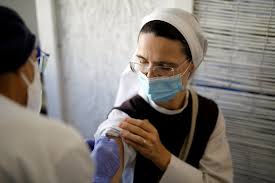JERUSALEM — As the Palestinian Authority began its vaccine rollout in early February, some Palestinians remained confused about the campaign and expressed uncertainty about the vaccine itself.
“They haven’t started vaccinating (more than health care workers) in the Bethlehem area and I have my fears and concerns about the vaccine. I don’t know what kind of vaccine we will get or whether it will be effective; whether it will be Pfizer, or the Russian or Chinese vaccine,” Suzy Atallah, 60, English language program coordinator and English teacher at the Terra Santa St. Joseph’s School for Girls in Bethlehem, said Feb. 8.
She said she was concerned about the vaccine’s long-term effect. “There are confusing articles and interviews with doctors who contradict each other: Some say they are for the vaccine, some are against it. Some say it is just a scam and there is something fishy going on.”
She said the Palestinian Authority is supposed to be responsible for the health care of Palestinians, but at the same time she does not know where the cash-strapped government can get the vaccines.
“Israel is supposed to provide. If not, where else are we going to get it?” she said.
Bethlehem resident Issa Sakleh, 39, said he was worried there would not be enough vaccines for everybody. As an employee with the Custody of the Holy Land, he goes through the checkpoint to Jerusalem every day and rides public transportation, where social distancing is not always possible.
He is eligible to get a vaccine through the Custody, he said, but he does not want to get one while his wife, who works in Bethlehem, does not.
Sometimes he said, he wishes he would just catch the virus so that he could build up natural immunity without need for a vaccine, but he knows that is not the solution — especially because he could infect other people without knowing it.
“We are not a 100 percent independent country, so I think Israel is still responsible on the lives and welfare of the Palestinians in the occupied territories,” he said. “Israel has vaccinated more than 2 million of its people and now is starting with people under the age of 25. I think the elders of Palestine and the Palestinian Territories need the vaccine more than a guy from Israel who is 25 years old.”
Rita Giacaman, professor of public health at Birzeit University in the West Bank, said she and her academic colleagues are ready to receive their jab. But she charges that neighboring Israel, which controls 62 percent of Palestinian territory in the West Bank, has not been doing its part to provide vaccines for the Palestinians.
Israel has been lauded for its quick and efficient vaccination rollout program, which has seen more than half of its population receiving at least the first vaccine since December. Among those vaccinated in Israel were Jewish and Arabs citizens, Palestinian East Jerusalem residents, and Palestinian health workers in East Jerusalem hospitals, but officials are facing growing international pressure from human rights groups and U.N experts for allegedly shirking the responsibility to provide vaccines for Palestinians in the West Bank and Gaza Strip.
Giacaman, referencing the Geneva Convention’s stipulation that occupying powers are responsible for providing health care services for the occupied people, said of Israel: “There is a moral obligation: Under occupation the health system has been starved, choked. We can’t control our border crossings, Israel controls 62 percent of the territory, the (closure) of Gaza has intensified since 2007 and there is a moral obligation like everyone else in the world to try to deal with the vaccine in an equitable way.”
Israel has said that, according to the Oslo Accords, the Palestinian Authority is responsible for the health care of the Palestinians, with coordination in cases of an epidemic. But, they said, the Palestinians have not asked for assistance.
At the end of January, Israel agreed to transfer 5,000 doses of the vaccine to the Palestinian Authority to immunize front-line medical workers, and on Feb. 1 the Unit for the Coordination of Government Activities in the Territories coordinated the passage of a first shipment — 2,000 doses — of the Moderna vaccine, with which the Palestinians began vaccinating. Health care personnel were first, to be followed by the elderly and the chronically ill in mid-February.
Dr. Mark Clarfield, professor emeritus at the Ben Gurion University Medical School for International Health and the former director of geriatric health at the Israeli Ministry of Health, said that while he believes Israel should help the Palestinians with the vaccines “insofar as possible,” the Palestinian Health Ministry’s unwillingness to coordinate with Israel to avoid appearing to be supporting any “normalization” of relations complicates matters.
By: Judith Sudilovsky
Source: cruxnow.com






